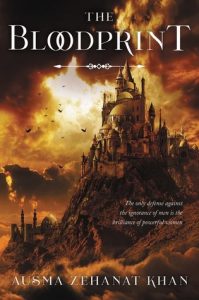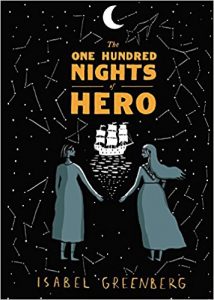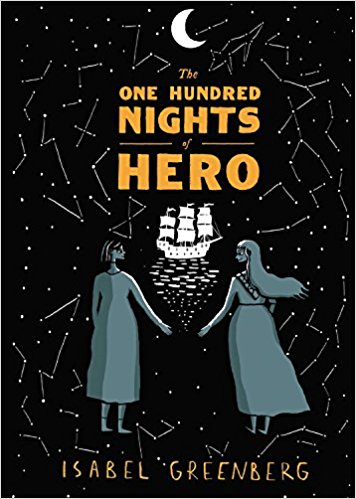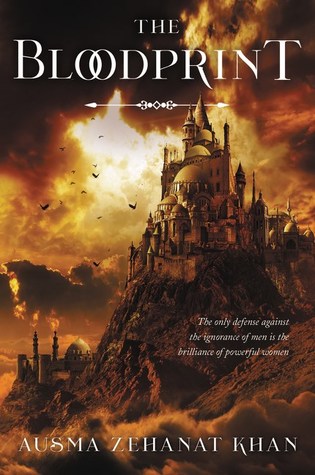Each year, Sirens chair Amy Tenbrink posts monthly reviews of new-to-her books from the annual Sirens reading list. You can find all of her Sirens Book Club reviews at the Sirens Goodreads Group. We invite you to read along and discuss!
Several years ago, Sirens featured a guest of honor who wrote one of my all-time favorite books. Despite not being a please-sign-my-book person generally, I sentimentally dragged my copy of this book to Sirens, and in asking the author to sign my copy, mentioned that I really loved their book.
This guest responded, quite drily and certainly correctly, that they had been sitting in the Sirens community room for two days listening to me talk about how much I loved all the books—with a strong implication that we were discussing but one book in an apparently very large pool of beloved literature. This is neither here nor there, but I did eventually convince this guest that there is love and there is love, and got them to sign my bloody book.
But, you know, they weren’t wrong. I do love many books. And upon reflection, I have come to realize that I do not love them in many different ways, but rather in three very specific ways.
Sometimes, I love a book because there’s something about it: world-building, perhaps, or a certain character, or the writer’s craft. The other elements of the book might be nonsensical dreck, but if I love an individual element or two enough, the book and I are good to go. Last year, memorably, I wrote a review of Kendare Blake’s Three Dark Crowns in which I wished for more coherent world-building and more competent characters and more stringent editing—and then proclaimed my love purely because in the end all three of those hatefully incompetent girl characters made bold, ambitious, hateful choices. Brava, I said, as I fell in love with a book whose world-building, characters, and writing style I did not like.
Other times, I love a book because it tells a good story. Maybe this is because of its world-building or characters or writing, or maybe this is essentially independent of those elements, but sometimes a book invites you to journey with its characters in a way that feels adventurous or relentless or shockingly human. These books are, I find, often compulsively readable. Perhaps A Crown for Cold Silver, where you’re halfway done before you take a breath. Or Bleeding Violet, where I would have followed Hanna and her unreliable narration and her weird hellmouth town anywhere.
But the best books, for me, are the books that—putting plot and characters and story aside—have something to say. They may also, and often do, have great plot and great characters and great story, but they’re something more: an exploration of gender, maybe, or a portrait of grief, a commentary on racism or an examination of the importance of friendship as we age. Ann Leckie’s Ancillary Justice, with its all-feminine pronouns, is a terrific example: a great story, a fascinating main character, but also an epiphany for a reader. Or Alif the Unseen, with its incisive intersections of myth, religion, and technology.
The Bloodprint, by Ausma Zehanat Khan, has something to say.
The setting for The Bloodprint, while fictional, will be familiar to anyone who follows the news: a patriarchal group known as the Talisman, led by a mysterious One-Eyed Preacher, is amassing power quickly and over an increasing large area. The Talisman’s methods are insidious: control communications by destroying reading materials, brutally execute rebels to sow fear, and enslave any woman not protected by a father or husband. It’s not too much of a spoiler to mention that, rather late in the book, we discover that many of the people now living under the Talisman’s rule—even for only a single generation—aren’t really bothered by their authoritarian rule. They don’t remember anything different. How horrifyingly quickly things change.
The book opens with Arian and Sinnia about to attack a caravan taking a number of enslaved women to who-knows-where. This has been Arian’s work for years, though despite the number of women she has freed and the number of Talisman men she has killed, she has yet to discover where the Talisman takes the women. She knows only that, until she learns more about what the Talisman is doing, she can’t free them all.
Shortly after the book opens, Arian and Sinnia are summoned home. Both women are Companions of Hira, a group of powerful women whose magic and authority is based on the Claim, a work of sacred scripture. But even in this group of women, called to a higher purpose, intrigue abounds and Arian cannot trust things she thought she knew.
The Bloodprint is Arian’s story: from her traumatic childhood, to abandoning her great love for her calling, to her commitment to saving her country and her people. The driving force behind the book is her discovery that a piece of the Claim, called the Bloodprint, is real—and if Arian can recover it, that might provide the Companions of Hira the power they need to truly fight the Talisman on a grand scale. As Arian journeys through the long-forgotten legends of her land, she learns the true power of perseverance, not only her own, but that of oppressed people.
Note: The Bloodprint is the first in a series, and has a seriously cliffhanger ending. If you like your series finished, you might want to wait.
I don’t usually include pieces of author bios in my book reviews, but this seems especially relevant: Khan holds a PhD in international human rights law with a specialization in military intervention and war crimes in the Balkans. In reading this work focused so much on war crimes, you’re in good hands.
Should you read it? Absolutely. While this story is purportedly Arian’s, it’s really the story of every rebel against an authoritarian regime who has found that their fight is against not only the regime, but their own people’s fear, blindness, carelessness, and ignorance. And if that doesn’t convince you, perhaps the book’s tag will: The only defense against the ignorance of men is the brilliance of powerful women.
Amy
Amy Tenbrink spends her days handling strategic and intellectual property transactions as an executive vice president for a major media company. Her nights and weekends over the last twenty-five years have involved managing a wide variety of events, including theatrical productions, marching band shows, sporting events, and interdisciplinary conferences. Most recently, she has organized three Harry Potter conferences (The Witching Hour, in Salem, Massachusetts; Phoenix Rising, in the French Quarter of New Orleans; and Terminus, in downtown Chicago) and eight years of Sirens. Her experience includes all aspects of event planning, from logistics and marketing to legal consulting and budget management, and she holds degrees with honors from both the University of Southern California’s Thornton School of Music and the Georgetown University Law Center. She likes nothing so much as monster girls, Weasleys, and a well-planned revolution.



















































Connect with the Sirens community
Sign up for the Sirens newsletter